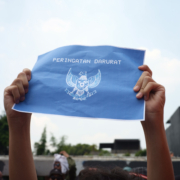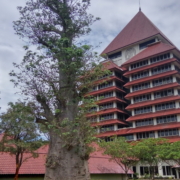
President Joko Widodo and President Vladimir Putin in 2018. Photo by Alexei Druzhinin/Kremlin.
Almost 120 days have passed since Russia invaded Ukraine, and the war continues to have ripple effects across the world. While western countries have been united in their support for Ukraine (to different degrees), many others have appeared reluctant to punish Russia for its actions. Some have even seemed supportive.
In 2022, Indonesia holds the G20 presidency, so its response to the conflict is important. After voting in support of the UN General Assembly resolution condemning the Russian attack on 2 March, Indonesia later abstained from the vote to suspend Russia from the UN Human Rights Council. It has been described as “a fence sitter” with a “tepid” and “wholly inadequate” response.
In the face of pressure from western countries to rescind Russian President Vladimir Putin’s invitation to the G20 leaders’ summit in Bali in November, Indonesia instead made the surprising move in April to also invite Ukrainian President Volodymyr Zelenskyy. In another sign of its ambivalent approach to the conflict, Indonesia made it clear that Putin would still be invited. A few days ago, Russian media even reported that President Joko “Jokowi” Widodo will travel to Russia to meet with Putin on 30 June, in preparation for the G20 summit.
How do we explain this ongoing ambiguity? How will the rest of the world view Indonesia when the country is under the global spotlight at the G20 summit later this year?
Indonesia’s position on the war
As I previously wrote for Indonesia at Melbourne, the Indonesian public, at least on social media, is largely sympathetic toward the Russian position, mainly because of strong anti-western attitudes. Meanwhile, the expert community in Indonesia has also been sympathetic toward Russia, blaming NATO and the west for the conflict, similar to the way some western experts have “westplained” the war. Both have often ignored the nuances of the varied Eastern European perspectives.
Months into the war, the Indonesian public on social media is still firmly pro-Russian. Analysis by Indonesian data analytics firm Evello in March 2022 showed that the majority of Indonesians on TikTok and Instagram support Russia.
But social media sentiment does not necessarily translate into real-life support for Russia. For example, an April 2022 phone survey by Saiful Mujani Research Consulting (SMRC) showed that while most Indonesians know about the ongoing war, only 20% said they supported the invasion, and 51% did not. Even so, slightly more (23%) blamed NATO and western countries than blamed Russia (17%) for the war.
So while Indonesian social media might seem overwhelmingly pro-Russian, we are unlikely to see any pro-Russian demonstrations in Jakarta. But neither will there be any significant pro-Ukraine demonstrations.
It is true that a couple of small pro-Ukraine protests sprung up in front of the Russian Embassy in early March and April, but it is hard to imagine a large demonstration like the rally that occurred in December 2016 to condemn Russia’s role in the war in Syria. The 2016 rally was driven by Islamic groups, and drew on discourses of solidarity with Muslim victims. By contrast, the two pro-Ukraine demonstrations in 2022 were organised by students and pro-democracy activists, and did not have any support from Islamic groups, because the war in Ukraine seems not to have any significant implications for the Indonesian Muslim community.
This is important because the Indonesian government can be responsive to public outrage, particularly if it results in large numbers taking to the streets. In one recent example, public anger over Singapore denying a visa to conservative preacher Abdul Somad Batubara eventually led Indonesia to send a diplomatic note to Singapore asking for clarification on the decision.
Without widespread protests, however, either online or on the streets, Indonesia is likely to maintain its ambiguous and pragmatic approach to the conflict.
The government’s pragmatic G20 position
Indonesia’s decision to invite Zelenskyy to the G20 summit is another example of Indonesia’s pragmatic approach to foreign policy. As Evan Laksmana has said, Indonesia likes to keep “pragmatic equidistance” from great powers US and China. In a similar way, by inviting Ukraine and Russia, Jokowi is trying to show that Indonesia can listen to western concerns while avoiding supporting Russia outright. Inviting both Russia and Ukraine puts the pressure back on the other parties: the west, Russia, and Ukraine. If their leaders refuse to attend, Jokowi can safely say, “at least we invited them”.
The public also supports letting Putin keep his invitation. An Indikator survey in May 2022 found that 76.6% of the Indonesian public agreed that Indonesia should invite Russia. Canceling Putin’s invitation would be seen as succumbing to western pressure.
Yet it is not clear what Indonesia will gain from inviting both Putin and Zelenskyy. Indonesia’s “independent and active” foreign policy is supposedly about acting in Indonesia’s best interests. But inviting Putin could derail discussions with western countries. Australian Prime Minister Anthony Albanese recently said he will attend, but there is still a chance other western countries will boycott the meeting.
Meanwhile, if Putin pulls out because of Zelenskyy’s presence, Indonesia will then have to decide how to deal with Zelenskyy, and any subsequent domestic pressure it may face.
If both leaders attend, Indonesia could face the difficult task of having to act as mediator if any tensions arise. While Indonesia has experience playing this role in Southeast Asia, its limited specialist knowledge of the Eastern European context does not bode well for its ability to be an effective mediator at the G20.
Jokowi’s G20 legacy
This double-invitation strategy is clearly all about buying time, with hopes that a ceasefire will happen, the war will soon be resolved, the world will return to the pre-24 February situation, and the G20 summit can proceed as a “normal” economic summit. Indonesian experts have argued that the Ukrainian issue must not define the G20 summit. The government still believes that a successful summit will be a success for Jokowi, and an important foreign policy legacy.
But the chances of the G20 being a “normal” economic summit are nonexistent. Even if there is an end to the war, it is difficult to see Russia improving relations with western countries any time soon. For example, Polish President Andrzej Duda recently said, “After Borodianka and Maripol, there must be no return to the policy of business as usual in relations with Russia.”
Many analysts have argued that a long war of attrition or military stalemate is looking increasingly likely. Whatever the outcome, the G20 summit will be held while the world is still in a situation of high tension. Both Russia and Ukraine might be exhausted, but will still be willing to fight. EU countries, meanwhile, will have varying positions on the conflict, depending on how they are coping with the economic and energy crisis, and whether they are affected by the food crisis that is expected to hit developing countries the hardest. The US may see a shift in tone depending on the results of mid-term elections on November 8.
If Jokowi wants the G20 summit to be his legacy, he must accept that discussing post-pandemic (and post-war) economic recovery is impossible during wartime, especially if the perpetrator of aggression is in attendance.
Jakarta must give Ukraine a significant role in discussions – Zelenskyy’s attendance should not be tokenistic. If discussions on peace occur, they should not only involve Russia and the west. Otherwise Jokowi’s efforts to reposition Indonesia as a significant global player will compromised.
Jokowi will not have much of a foreign policy legacy if he is only focused on what economic benefits Indonesia can get from the G20. He does not face the pressure of having to win another election in 2024, so he should be less concerned about seeking public approval and can take more political risks.
And if a peace deal or settlement of disputes between Russia and Ukraine was reached at the G20, that would be very much to his and Indonesia’s benefit. It is time for Jokowi to show whether he can transform from being a national to a global leader.











